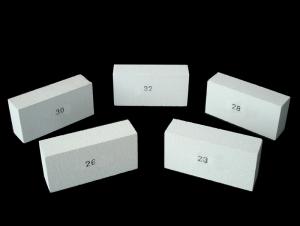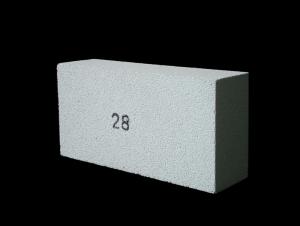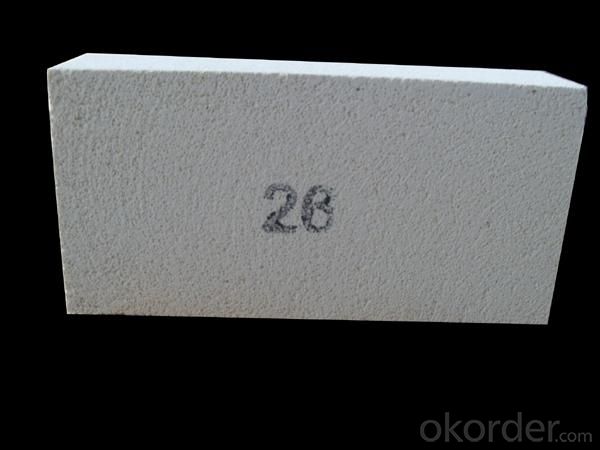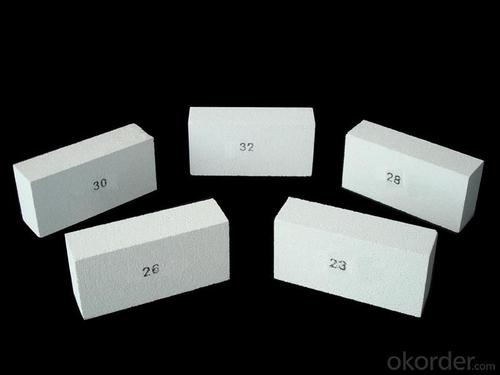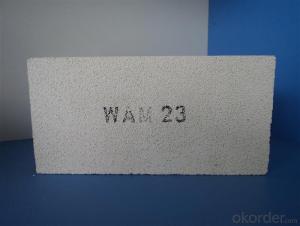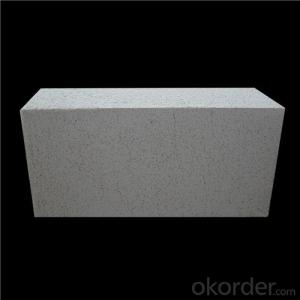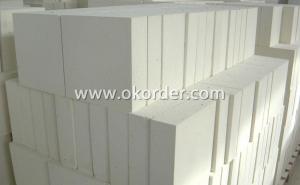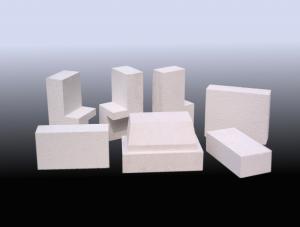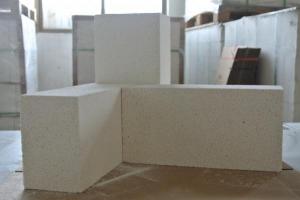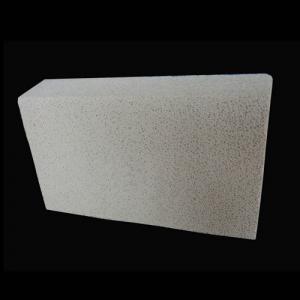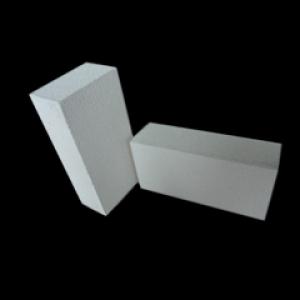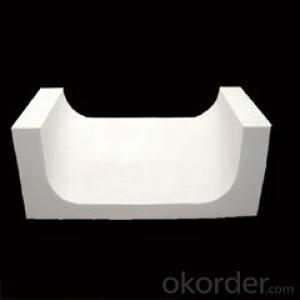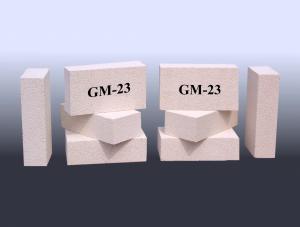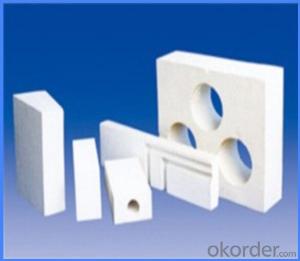Insulating Fire Brick - GJM28
- Loading Port:
- China Main Port
- Payment Terms:
- TT or L/C
- Min Order Qty:
- 1000 pcs pc
- Supply Capability:
- 1000 Tons Per Month pc/month
OKorder Service Pledge
OKorder Financial Service
You Might Also Like
General Information of Insulating Fire Brick GJM28
Insulating fire brick GJM28 are produced by high purity alumina and low iron raw materials. A viariety of shapes are available.
To make our firebricks more energy and cost effective, we have different manufacturing methods for our insulating fire bricks casting and extruding method.
For insulating fire bricks GJM28,we choose the extruding method. Extruding insulating fire bricks have better strength and offering great performance in load bearing applications and in conditions where abrasion from mechanical abuse or flow of hot gases.
Characteristics of Insulating Fire Brick GJM28
The organic fillers, which are mixed in the materials and then burned out during sintering, give our insulating fire bricks a uniform controllable pore structure. The insulating fire bricks exhibit the following characteristics:
Light weight and low thermal conductivity allows thinner furnace walls
Maintain stable structural strength throughout ambient to maximum service termperature
Low heat storage results in rapid cooling and heating operation
Low iron and impurities to enhance reducing atmosphere
High thermal shock resistance in preventing spalling
Typical Application of Insulating Fire Brick GJM28
Ceramic shuttle kilns
Metal heat treatment furnaces
Steel billet reheating furnaces
Oil refrinery heaters
Laboratory furnaces
Backup insulation for all furnaces
Technical Data of Insulating Fire Brick GJM28
|
| GJM28 |
Physical Properties: |
|
|
Classifiction Temperature | ℃ | 1500.0 |
Density | Kg/m3 | 900.0 |
Cold Crushing Strength | Mpa | 2.5 |
Reheating Linear Change(24hrs) |
|
|
1510℃ | % | 0.6 |
Hot Load Strength Deform(90 minutes) |
|
|
1320℃ at 0.069 Mpa(10psi) | % | 0.3 |
Thermal Conductivity |
|
|
400℃ | W/m.k | 0.3 |
600℃ | W/m.k | 0.3 |
800℃ | W/m.k | 0.4 |
1000℃ | W/m.k | 0.4 |
1200℃ | W/m.k | 0.4 |
Specific Heat | KJ/Kg.K | 1.1 |
Chemical Analysis: |
|
|
Al2O3 | % | 60.0 |
SiO2 | % | 38.2 |
Fe2O3 | % | 0.6 |
TiO2 | % | 0.1 |
CaO | % | 0.1 |
MgO | % | 0.1 |
Na2O+K2O | % | 0.8 |
We has success in insulating fire bricks due to their cost-effectiveness, excellent insulation properties. CNBM also has experience in insulating fire bricks application and would like to assist you in product selection, system design, and installation techniques.
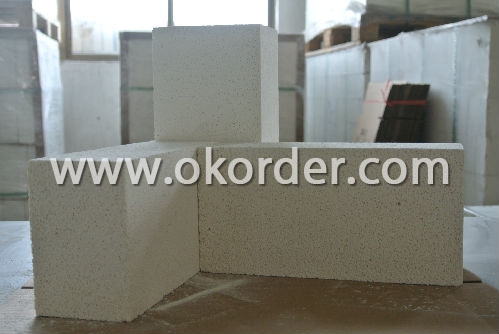
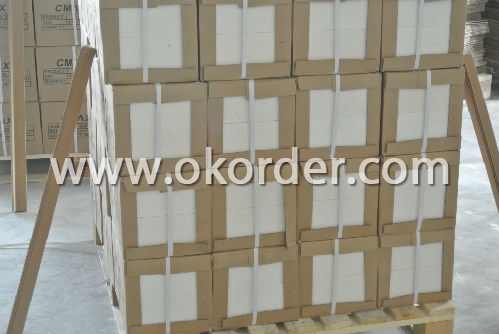
- Q: Can insulating fire bricks be used as a lining material for boilers?
- Yes, insulating fire bricks can be used as a lining material for boilers. Insulating fire bricks are designed to withstand high temperatures and provide excellent insulation, making them suitable for use in boiler linings.
- Q: Are insulating fire bricks resistant to fluorine gas?
- Typically, insulating fire bricks do not possess resistance against fluorine gas. Known for its high reactivity and corrosiveness, fluorine gas has the capability to react with diverse substances, including insulating fire bricks. The corrosive properties of fluorine gas may result in structural and integrity harm to the fire bricks, eventually leading to their degradation or malfunction. Hence, it is recommended to opt for an alternative refractory material that is specifically engineered to endure the corrosive impact of fluorine gas, in case it is needed for a specific application.
- Q: Are insulating fire bricks suitable for use in chimneys and fireplaces?
- Yes, insulating fire bricks are suitable for use in chimneys and fireplaces. Insulating fire bricks are designed to withstand high temperatures and provide excellent thermal insulation. They are made from lightweight materials such as ceramic fibers or lightweight aggregates, which help to retain heat and prevent heat loss. This makes them ideal for lining chimneys and fireplaces as they can effectively trap and radiate heat, resulting in improved energy efficiency. Additionally, insulating fire bricks have low thermal conductivity, meaning they can resist cracking and spalling caused by rapid temperature changes, ensuring their durability and longevity. Overall, insulating fire bricks are a reliable and effective choice for enhancing the performance and safety of chimneys and fireplaces.
- Q: Can insulating fire bricks be used in ladles?
- Yes, insulating fire bricks can be used in ladles.
- Q: What is the typical weight of an insulating fire brick?
- The weight of an insulating fire brick can differ based on its specific type and manufacturer. On average, it falls within the range of 2.5 to 3.5 pounds (1.1 to 1.6 kilograms). It's worth noting that this weight estimation applies to a standard-sized brick measuring 9 x 4.5 x 2.5 inches (22.9 x 11.4 x 6.4 centimeters). Slight variations in weight may occur due to varying densities and compositions of these bricks. Therefore, it is advisable to consult the manufacturer's specifications for precise information.
- Q: Can insulating fire bricks be used in solar power plants?
- Yes, insulating fire bricks can be used in solar power plants. They are commonly used in the construction of high-temperature equipment such as solar receivers, combustion chambers, and thermal energy storage systems. Insulating fire bricks help to minimize heat loss and maintain high operating temperatures, making them suitable for various applications in solar power plants.
- Q: Are insulating fire bricks chemically resistant?
- Insulating fire bricks are generally chemically resistant to a wide range of substances. These bricks are typically made from high-quality refractory materials such as alumina, silica, or a combination of both. These materials have excellent resistance to chemical attack, making insulating fire bricks highly resistant to the corrosive effects of various chemicals. However, it is important to note that the chemical resistance of insulating fire bricks can vary depending on the specific composition and manufacturing process. While they are generally resistant to most chemicals, there may be certain aggressive chemicals or extreme conditions that could potentially degrade or erode the bricks over time. To ensure the optimal chemical resistance of insulating fire bricks, it is recommended to consult the manufacturer's specifications or seek expert advice for specific applications. This will help ensure that the bricks are suitable for the intended chemical environment and will perform reliably over the desired lifespan.
- Q: Are insulating fire bricks resistant to moisture absorption?
- Yes, insulating fire bricks are highly resistant to moisture absorption. They are designed to have low porosity and are made from materials that do not readily absorb water. This makes them ideal for applications where moisture resistance is crucial, such as in kilns, furnaces, and other high-temperature environments.
- Q: What is the typical creep resistance of an insulating fire brick?
- The typical creep resistance of an insulating fire brick is high, as it is designed to withstand high temperatures without deforming or sagging over time.
- Q: Can insulating fire bricks be used for kiln furniture?
- Yes, insulating fire bricks can be used for kiln furniture. Insulating fire bricks are lightweight, have high insulating properties, and can withstand high temperatures, making them suitable for use as shelves, posts, or supports in kilns. They help to conserve energy, improve heat distribution, and protect the kiln structure.
1. Manufacturer Overview
| Location | Jiangsu, China |
| Year Established | 2008 |
| Annual Output Value | Above US$ 35 Million |
| Main Markets | Germany; Italy; Turkey; France; England; Japan; Thailand; Vietnam; Idonesia; USA |
| Company Certifications | ISO 9001:2008 |
2. Manufacturer Certificates
| a) Certification Name | |
| Range | |
| Reference | |
| Validity Period |
3. Manufacturer Capability
| a) Trade Capacity | |
| Nearest Port | Shanghai; Qingdao |
| Export Percentage | 10% |
| No.of Employees in Trade Department | 3 People |
| Language Spoken: | English; Chinese; |
| b) Factory Information | |
| Factory Size: | Twenty five thousand tons per year |
| No. of Production Lines | Above 5 |
| Contract Manufacturing | OEM Service Offered; Design Service Offered |
| Product Price Range | High; Average |
Send your message to us
Insulating Fire Brick - GJM28
- Loading Port:
- China Main Port
- Payment Terms:
- TT or L/C
- Min Order Qty:
- 1000 pcs pc
- Supply Capability:
- 1000 Tons Per Month pc/month
OKorder Service Pledge
OKorder Financial Service
Similar products
Hot products
Hot Searches
Related keywords
